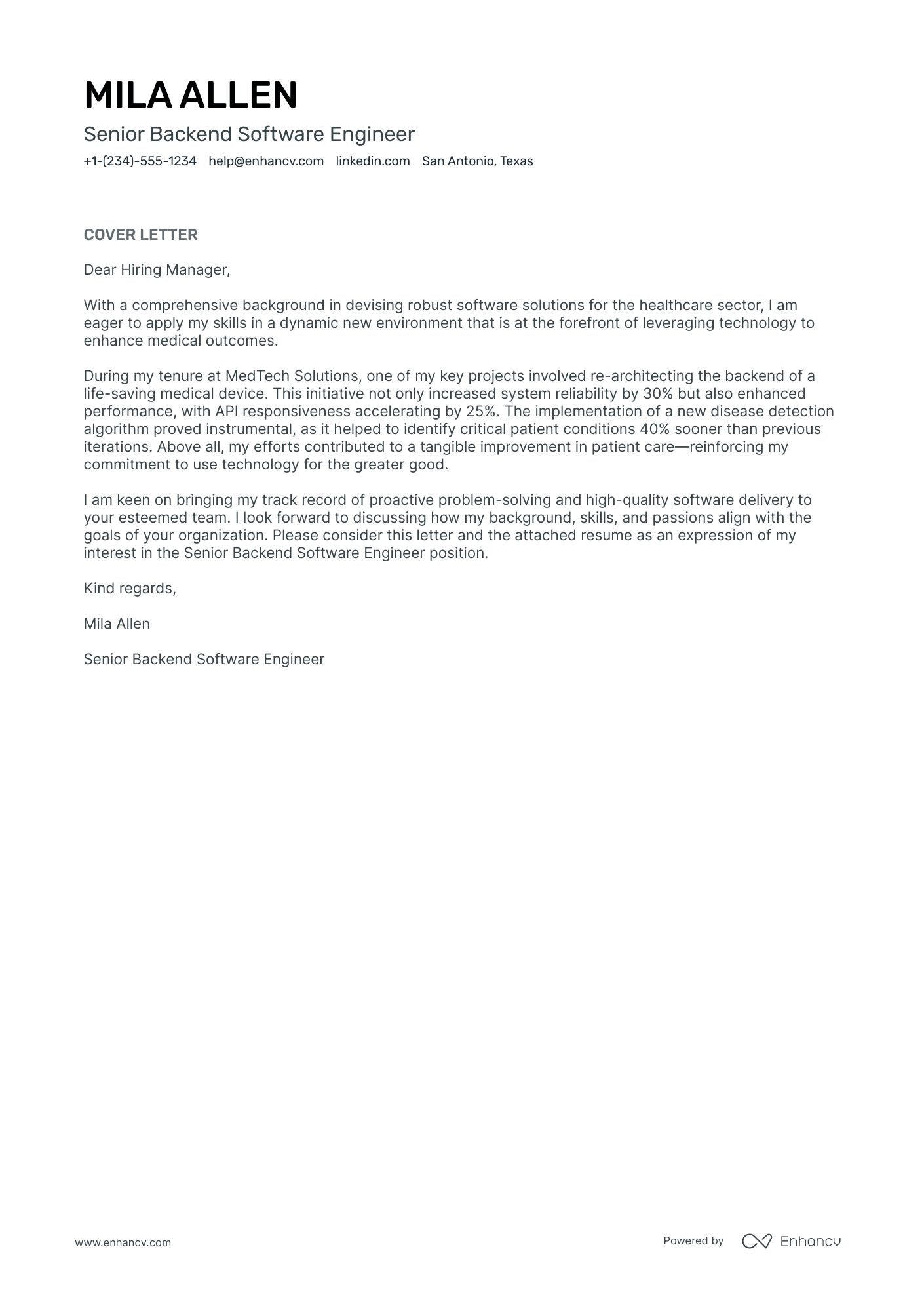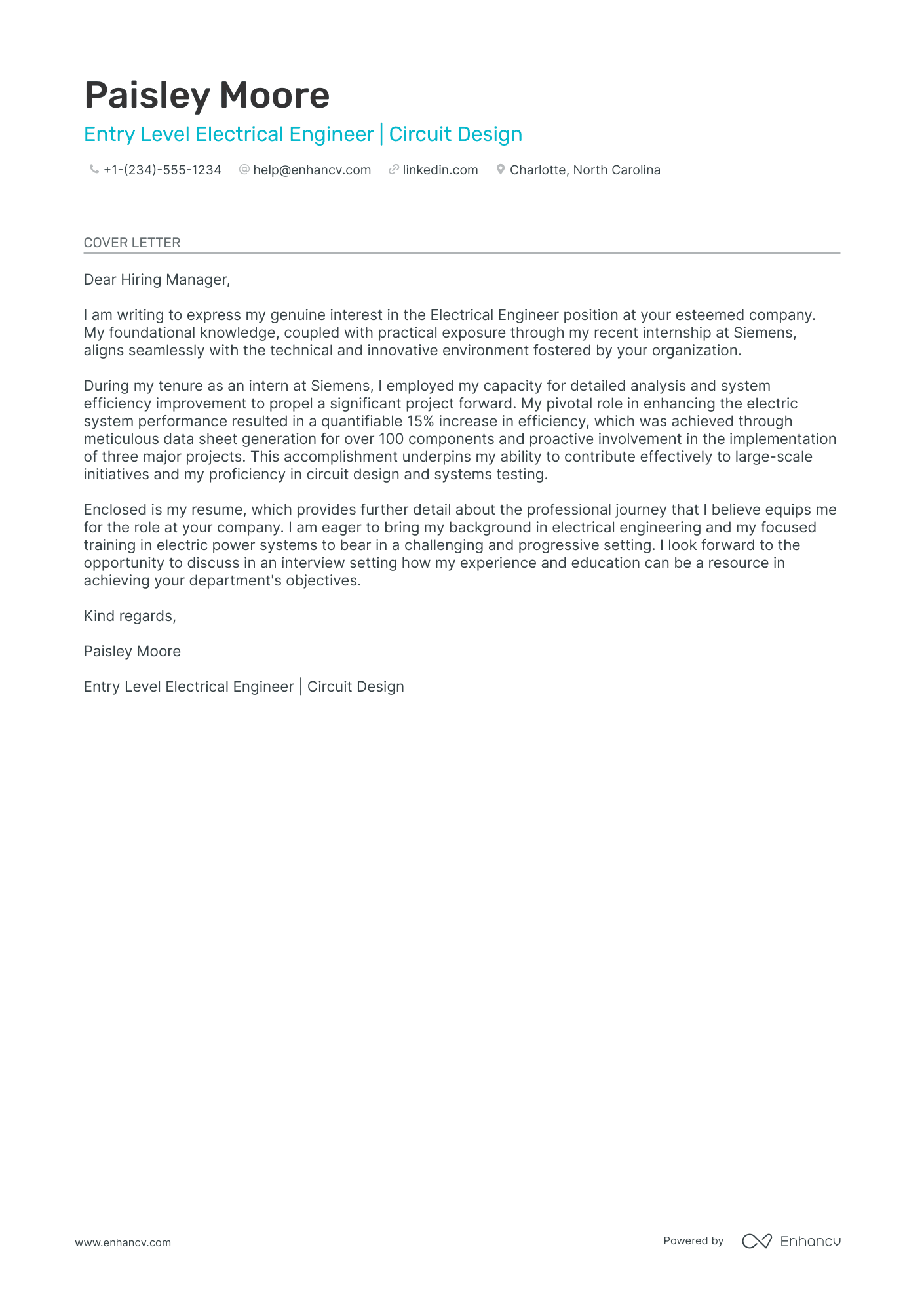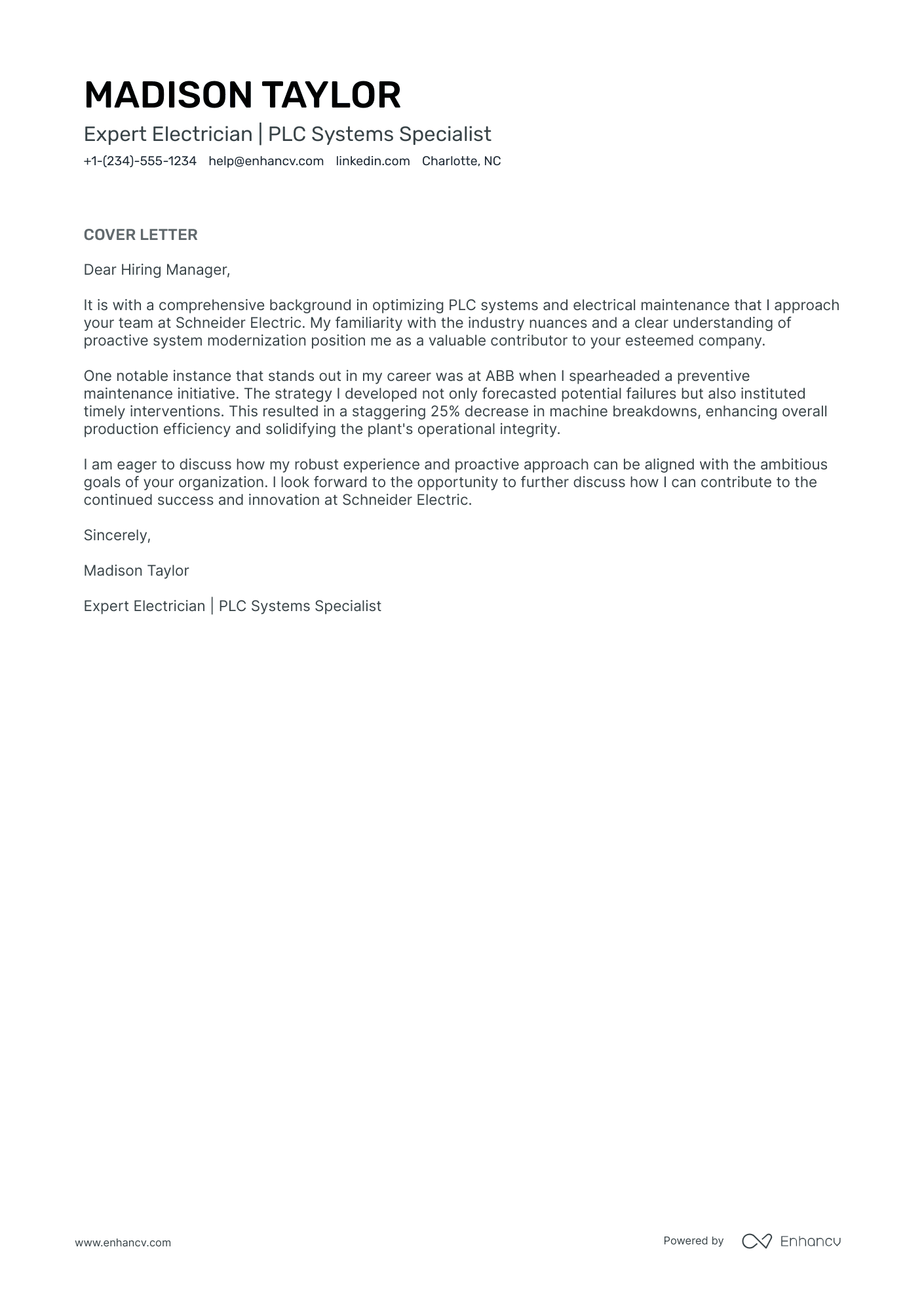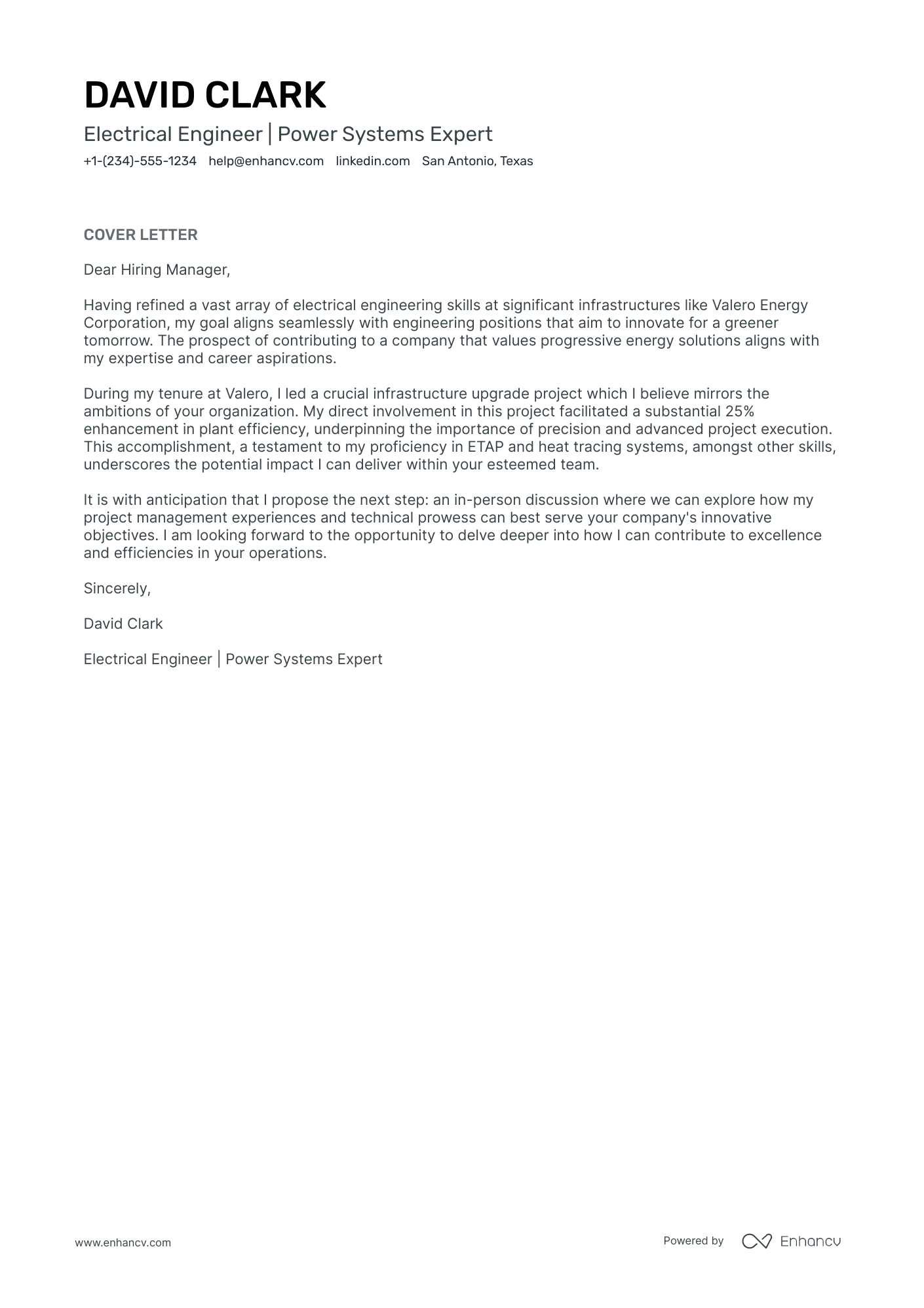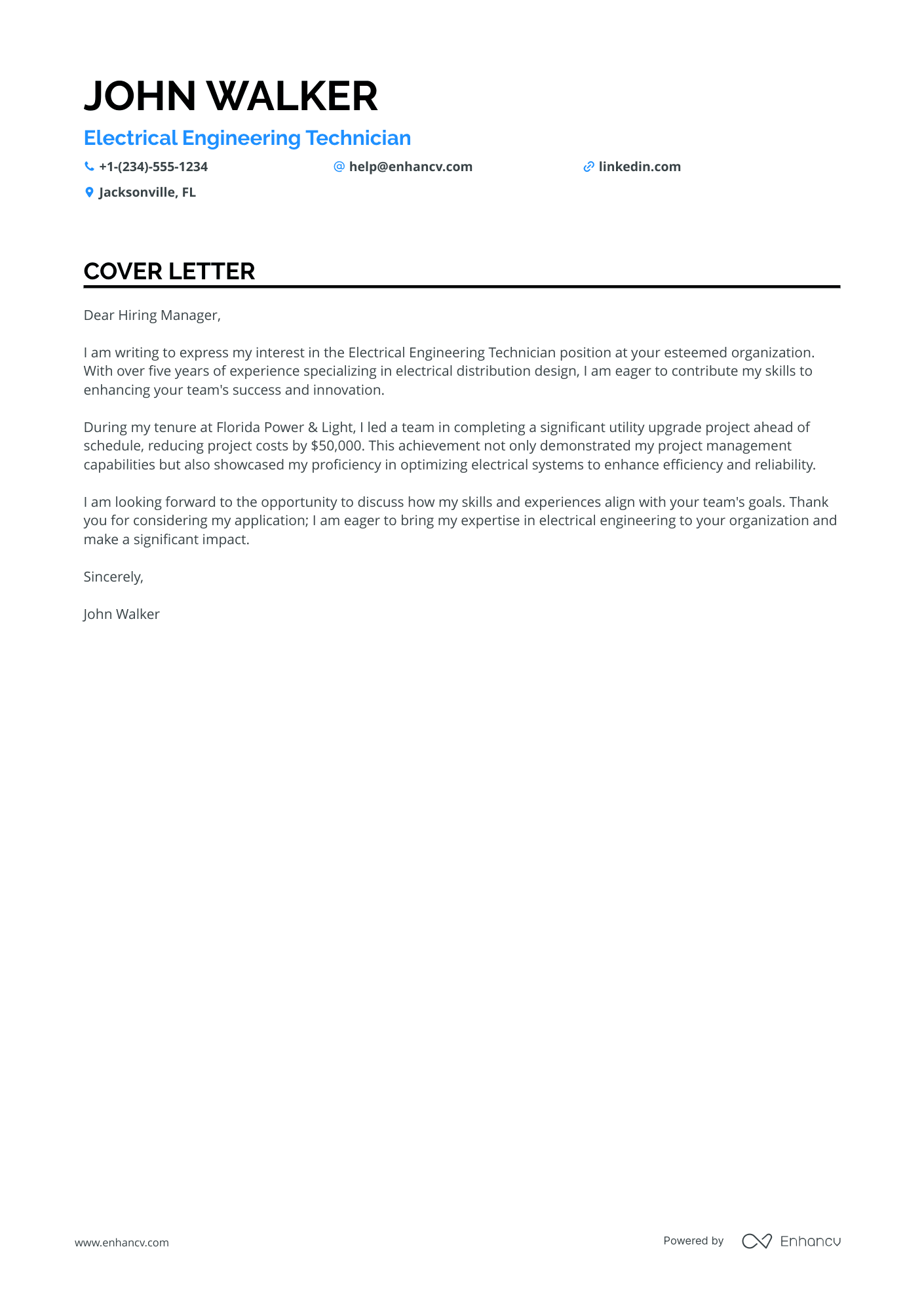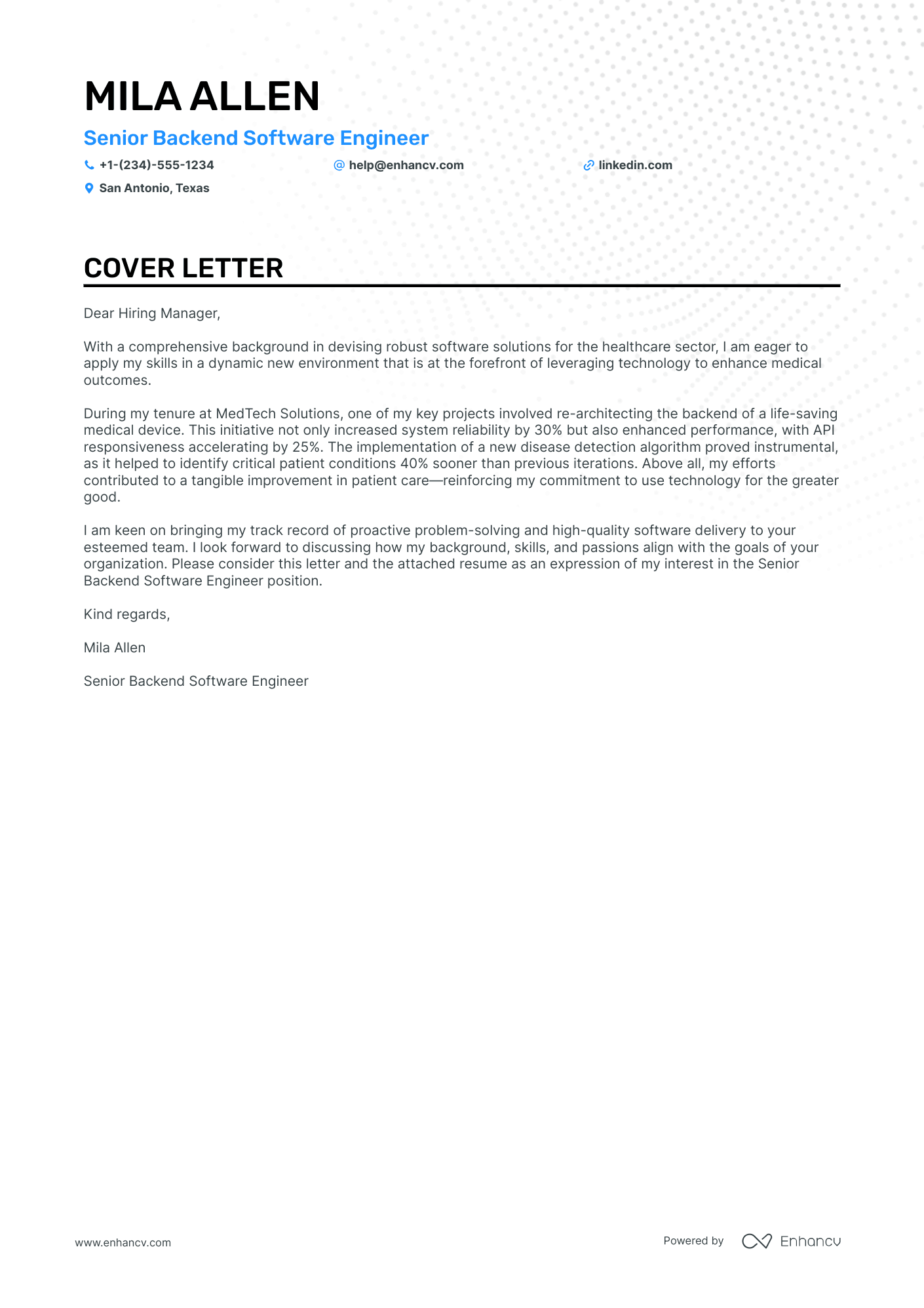Embarking on your job hunt in the electrical engineering realm, you've quickly realized a compelling cover letter is more than just a formality—it's your ticket to standing out. Unlike your resume, which itemizes your qualifications, a cover letter is your chance to spin the narrative of your proudest professional moment, painting a vivid picture that's distinctly yours. Keep it concise, dodge the clichés, and remember, one page is your stage to blend professionalism with personal triumph. Let's energize your job application with a cover letter that connects circuits and captivates hiring managers.
- Personalize the greeting to address the recruiter and your introduction that fits the role;
- Follow good examples for individual roles and industries from job-winning cover letters;
- Decide on your most noteworthy achievement to stand out;
- Format, download, and submit your electrical engineering cover letter, following the best HR practices.
Use the power of Enhancv's AI: drag and drop your electrical engineering resume, which will swiftly be converted into your job-winning cover letter.
If the electrical engineering isn't exactly the one you're looking for we have a plethora of cover letter examples for jobs like this one:
- Electrical Engineering resume guide and example
- Reliability Engineer cover letter example
- Engineering cover letter example
- Construction Worker cover letter example
- Audio Engineer cover letter example
- Petroleum Engineer cover letter example
- Senior Mechanical Engineer cover letter example
- Product Engineer cover letter example
- Project Engineer cover letter example
- Manufacturing Engineer cover letter example
- Quality Engineer cover letter example
Drop your resume here or choose a file.
PDF & DOCX only. Max 2MB file size.
Electrical engineering cover letter example
CARLA JENSEN
Seattle, WA
+1-(234)-555-1234
help@enhancv.com
- Demonstrating applicable experience: The cover letter highlights leadership in a relevant project (Building Management Systems), which is crucial for a senior engineering role, suggesting the candidate is seasoned in managing both projects and teams.
- Quantifiable achievements: Mentioning the completion of 9 projects and the training of 5 electricians, and notably saving 15% forecasted time, provides tangible evidence of the candidate's effectiveness and efficiency.
- Alignment with company values: The candidate explicitly mentions an awareness of the company's standards and expresses a desire to contribute to their pioneering work, indicating a match between their professional ethos and the organization's culture.
- Call to action: Closing with an invitation to discuss their background and goals in relation to the team's needs serves as a proactive step towards initiating further communication and demonstrates eagerness to engage with the hiring process.
Structuring and formatting your electrical engineering cover letter
Here's what the structure of your electrical engineering cover letter should include:
- Header (with your name, the position you're applying for, and the date);
- Salutation (or greeting);
- Introductory paragraph (or your opening statement);
- Body paragraph (or further proof of your experience);
- Closing paragraph (with a call to action);
- Signature (that is optional).
Use the same font for your electrical engineering resume and cover letter - modern fonts like Lato and Rubik would help you stand out.
Your electrical engineering cover letter should be single-spaced and have a one-inch margins - this format is automatically set up in our cover letter templates and our cover letter builder.
When submitting your cover letter, always ensure it's in PDF, as this format keeps the information intact (and the quality of your document stays the same).
On one final note - the Applicant Tracker System (ATS or the software that is sometimes used to initially assess your application) won't read your electrical engineering cover letter.
Maximize your efficiency! With our free cover letter generator, you’ll have a great letter in moments.
The top sections on a electrical engineering cover letter
- Header: Including your contact information, the date, and the employer's contact details establishes professionalism and makes it easy for the recruiter to reach out to you.
- Opening Greeting: Addressing the hiring manager or team by name if possible demonstrates that you have conducted research and personalized your cover letter.
- Introduction: A brief introduction highlighting your passion for electrical engineering and mentioning how you discovered the job opportunity sets the stage for your application and grabs the reader’s attention.
- Body (Experience and Skills): This section should showcase specific electrical engineering projects you've handled, technical skills you possess, and relevant successes you've achieved that align with the job description.
- Closing and Call to Action: Ending your cover letter with a confident statement about looking forward to discussing how you can contribute to the team compels the recruiter to consider your application and invites further engagement.
Key qualities recruiters search for in a candidate’s cover letter
- Proficiency in electrical design and simulation software (e.g., AutoCAD Electrical, LTspice, PSpice): Essential for creating and testing electrical schematics and layouts efficiently.
- Understanding of electrical standards and codes (such as NEC, IEEE, IEC): Ensures compliance with safety regulations and industry best practices.
- Hands-on experience with electrical systems (e.g., circuit troubleshooting, PCB design, wiring): Demonstrates practical skills and the ability to apply theoretical knowledge in real-world applications.
- Strong analytical and problem-solving skills: For diagnosing and solving complex electrical issues which are integral to the development and maintenance of electrical systems.
- Experience with hardware prototyping and testing: Shows an ability to transform concepts into tangible products and evaluate their performance, which is critical in product development.
- Excellent project management and teamwork abilities: Indicates that the candidate can lead projects, work collaboratively with multidisciplinary teams, and deliver results on time and within budget.
Kick off your electrical engineering cover letter: the salutation or greeting
When writing your electrical engineering cover letter, remember that you're not writing for some complex AI or robot, but for actual human beings.
And recruiters, while on the lookout to understand your experience, would enjoy seeing a cover letter that is tailored to the role and addresses them. Personally.
So, if you haven't done so, invest some time in finding out who's the hiring manager for the role you're applying to. A good place to start would be LinkedIn and the corporate website.
Alternatively, you could also get in touch with the company to find out more information about the role and the name of the recruiter.
If you haven't met the hiring manager, yet, your electrical engineering cover letter salutation should be on a last-name basis (e.g. "Dear Mr. Donaldson" or "Dear Ms. Estephan").
A good old, "Dear HR Professional" (or something along those lines) could work as your last resort if you're struggling to find out the recruiter's name.
List of salutations you can use
- Dear Hiring Manager,
- Dear [Company Name] Team,
- Dear [Department Name] Hiring Committee,
- Dear Ms./Mr. [Last Name],
- Dear Dr. [Last Name],
- Dear [Job Title] Search Committee,
What to include in those first two sentences, or your electrical engineering cover letter introduction
Have you ever wondered what the best way is to present your profile in the electrical engineering cover letter introduction?
There's no right or wrong answer if you're being concise and authentic to yourself.
Some professionals start their electrical engineering cover letter by:
- congratulating the company - focusing on something impressive, whether that's an award, an industry-leading project, or a key event;
- aligning their passion for the field or industry with the job - if you're enthusiastic about what you do, you'd thus grow your skill set and value as a professional.
The middle or body of your electrical engineering cover letter body: a great instrument to tell a story
Now that you've set the right tone with the greeting and introduction of your electrical engineering cover letter, it's time to get down to business.
Hear us out, the body of your electrical engineering cover letter is the best storytelling instrument you have, in your job-hunting arsenal.
Writing the next three to six paragraphs, take the time to reassess the advert to discover job-crucial requirements.
Next, choose one accomplishment that covers those key skills and talents.
Use precisely that achievement to tell an exciting story of how you match the ideal candidate profile.
In the undertones of your story or electrical engineering cover letter body, hint at the difference you'd make and sell your application as the perfect one for the job.
Ending your electrical engineering cover letter: a closing paragraph with a promise
If you're thinking of finishing your electrical engineering cover letter with a "Sincerely yours" or "Thanks for the consideration," you need to read on.
End the final paragraph of your electrical engineering cover letter with a twist:
- a promise - of how you'd grow as a professional, part of the company, or improve organizational metrics;
- a call to action - prompt interviewers with some follow-up actions if they are interested in your profile.
A personalized ending would surely help you to stand out by being a memorable candidate.
Addressing limited to no experience in the electrical engineering cover letter
There's nothing to worry about if you lack professional experience.
Your electrical engineering cover letter could bridge the gaps in your professional history by focusing on what matters most to recruiters, that's either:
- skills - focusing on transferable ones you've gained, thanks to your life experience (e.g. volunteering, certificates, etc.);
- achievements - select the most relevant and noteworthy one from your history (e.g. education, projects, etc.);
- motivation - describe how you envision your professional growth in the next up to five years, thanks to this opportunity.
Key takeaways
Writing your electrical engineering cover letter doesn't need to turn into an endless quest, but instead:
- Create an individual electrical engineering cover letter for each role you apply to, based on job criteria (use our builder to transform your resume into a cover letter, which you could edit to match the job);
- Stick with the same font you've used in your resume (e.g. Raleway) and ensure your electrical engineering cover letter is single-spaced and has a one-inch margin all around;
- Introduce your enthusiasm for the role or the company at the beginning of your electrical engineering cover letter to make a good first impression;
- Align what matters most to the company by selecting just one achievement from your experience, that has taught you valuable skills and knowledge for the job;
- End your electrical engineering cover letter like any good story - with a promise for greatness or follow-up for an interview.
Electrical Engineering cover letter examples
By Experience
Senior Electrical Engineer
Entry-Level Electrical Engineer
By Role
Electrical Automation Engineer
Power Electrical Engineer
Electrical Engineering Technician
- Highlighting Relevant Experience: The cover letter effectively showcases over five years of relevant experience in electrical distribution design, which is critical for the role of an Electrical Engineering Technician.
- Demonstrating Achievements: By mentioning the successful utility upgrade project that was completed ahead of schedule and under budget, the letter emphasizes the candidate's ability to deliver tangible results efficiently.
- Showcasing Leadership and Management Skills: Leading a team to achieve a complex goal is highlighted, suggesting strong leadership and project management capabilities, which are valuable in technical roles.
- Aligning Candidate's Goals with Company Goals: The letter expresses a clear interest in both contributing to and aligning with the company's objectives, indicating a proactive and engaged attitude.
